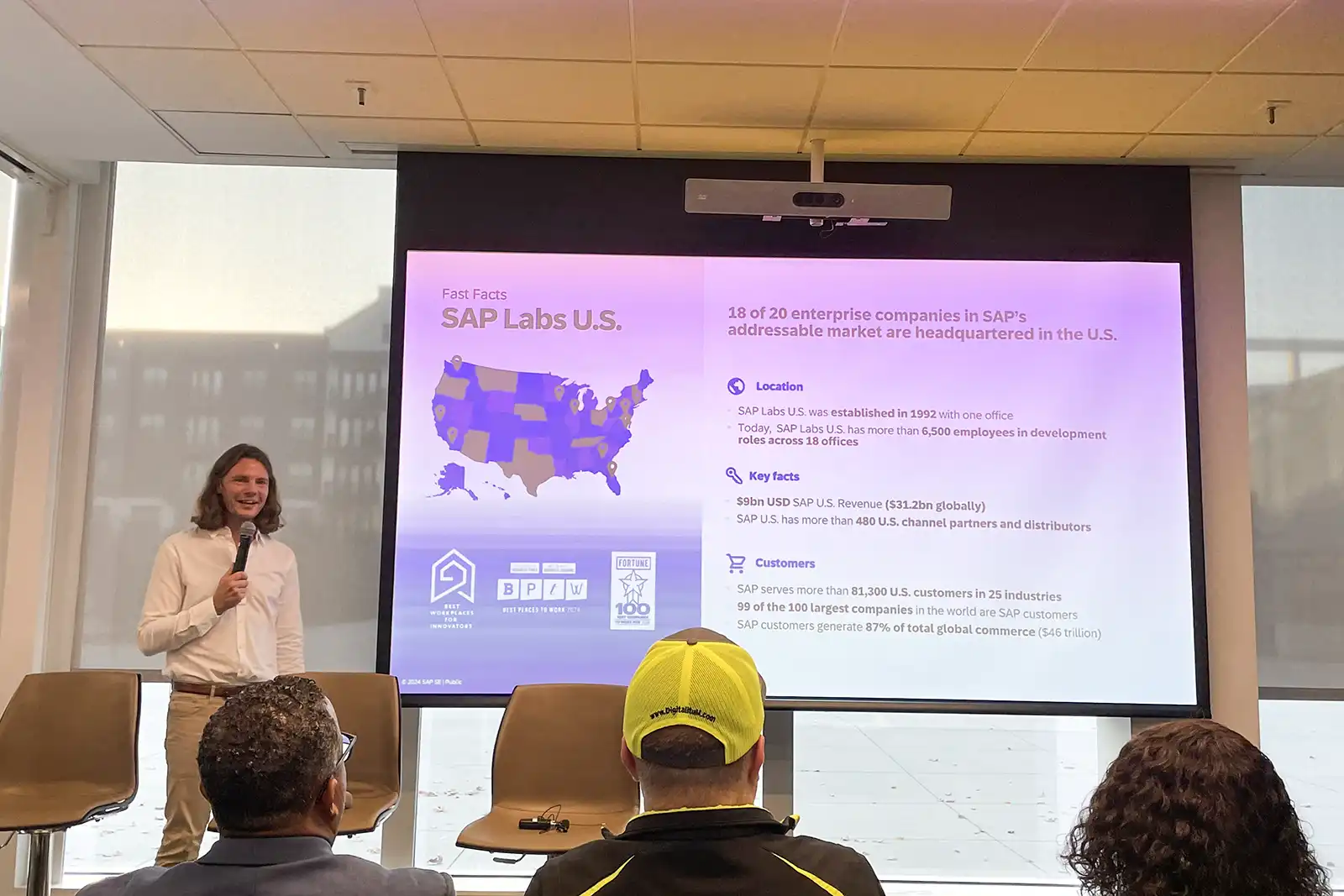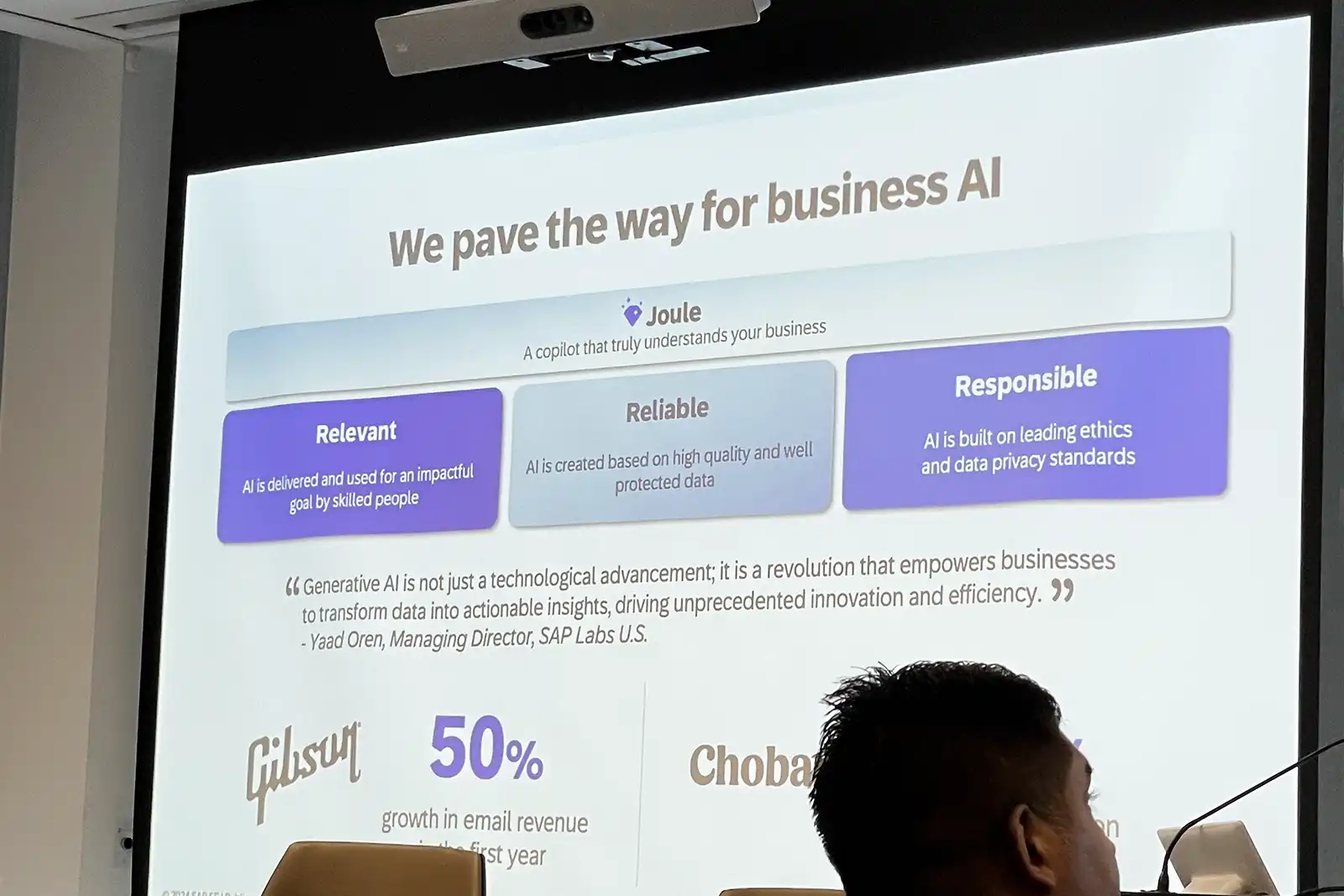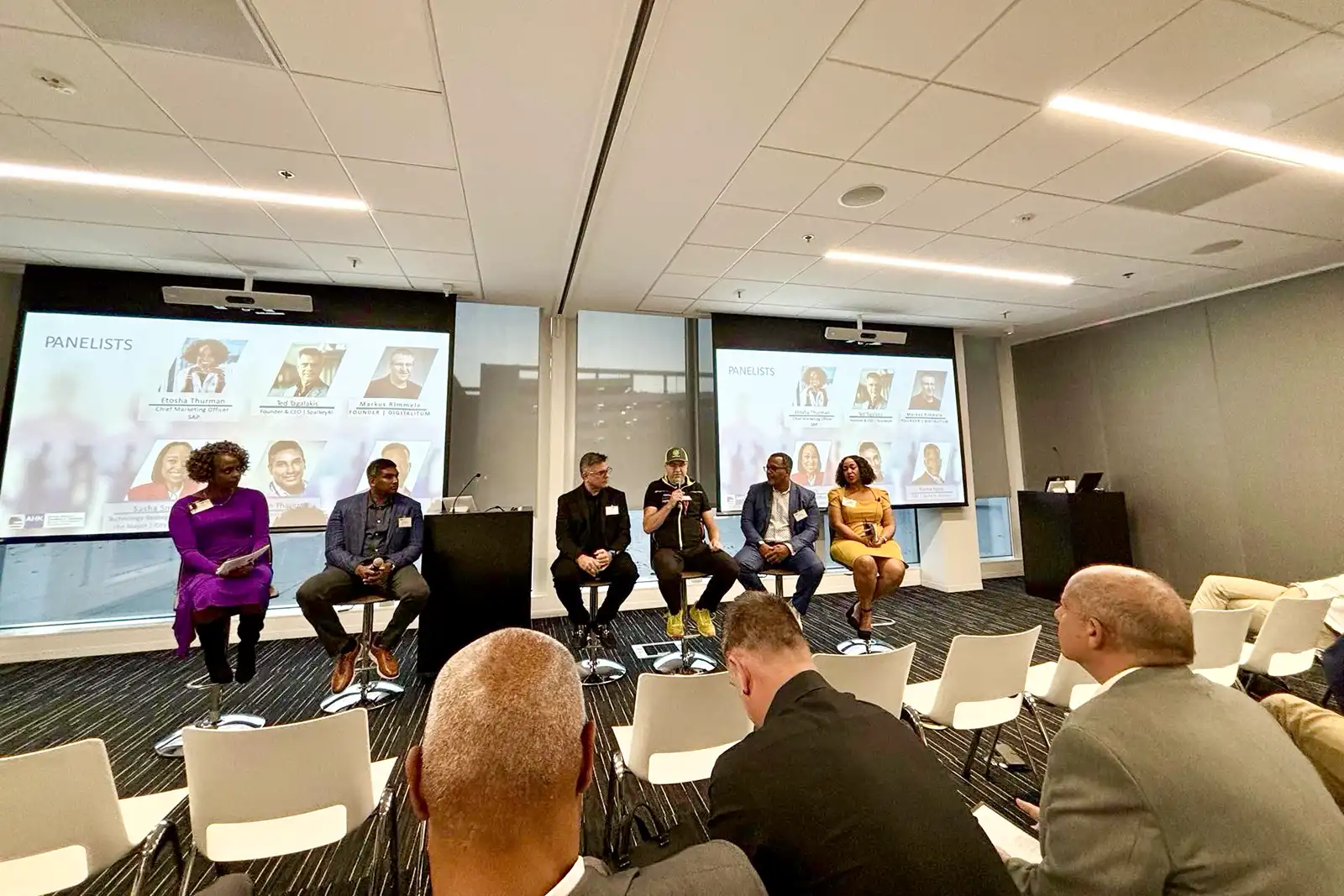AP Roadshow at Mercedes Benz
USA – Atlanta
Panelists:
Daniel Zimmer – SAP Labs
Etosha Thurman – CMO, Intelligent Spend and Business Network at SAP & Panel Moderator
Deelan Thaver – Director Enterprise Solutions at Mercedes-Benz USA
Nguvi Kahiha – CEO, Iris Inc. North America
Markus Rimmele – Managing Principal of DigitalituM
Natasha (Sasha) Smith – Tech Strategist @ City of Atlanta | Technology Strategy
Ted Tagalakis– Founder & CEO, SparkyAI!

Sasha Smith, David Zimmer, Deelan Thaver, Etosha Thurman, Ted Tagalakis , Markus Rimmele and Nguvi Kahiha
Unlocking Business Efficiency: The Role of AI Solutions in Smart Manufacturing
In the rapidly evolving landscape of smart manufacturing, Artificial Intelligence (AI) is emerging as a pivotal force driving business efficiency and digital transformation. Industries worldwide are witnessing a shift as AI solutions become integral to streamlining operations, enhancing productivity, and fostering innovation. The impact of AI technology is profound, as it enables manufacturers to optimize processes, reduce costs, and improve product quality. This document delves into AI’s significant role in smart manufacturing, highlighting real-world examples of its success and exploring the strategic frameworks that ensure its effective implementation. As we embark on this journey, we’ll uncover how AI strategies are reshaping industries, offering unprecedented opportunities for growth and competitiveness in the digital age.
The AI Revolution in Smart Manufacturing
Opportunities Across Business Functions
AI technology offers vast opportunities across various business functions within smart manufacturing. By streamlining operations, AI solutions enhance both top-line growth and bottom-line efficiency. For instance, Gibson Guitars increased their email revenue by 50% in the first year of implementing an AI solution from SAP. Similarly, Chobani achieved a 75% reduction in time spent on travel expense management. These examples highlight the tangible benefits AI brings to diverse business areas.
Moreover, AI enables predictive maintenance, which minimizes downtime and extends equipment life by analyzing real-time data and anticipating failures before they occur. AI optimizes supply chain management in logistics by predicting demand and adjusting inventory accordingly. By embracing AI strategies, manufacturers can improve productivity, reduce costs, and maintain high product quality. As AI continues to evolve, its potential to revolutionize business functions in manufacturing will only grow, offering a strategic advantage in a competitive market.
AI Solutions in Real-world Applications
AI solutions transform smart manufacturing by offering practical applications that significantly enhance business efficiency. For example, AI-powered predictive analytics can forecast machine failures, reducing maintenance costs and downtime. This approach allows companies to conduct maintenance only when necessary, optimizing resource allocation.
Furthermore, AI in quality control is proving invaluable by detecting defects in products much faster than traditional methods. This not only improves product quality but also reduces waste and operational costs. In logistics, AI optimizes routing and scheduling, ensuring timely delivery and minimizing fuel consumption.
Companies like Mercedes-Benz and Chobani already leverage AI to revolutionize their manufacturing processes. Mercedes-Benz employs AI for process automation, enhancing production efficiency and product quality. Meanwhile, Chobani uses AI to streamline its financial operations, demonstrating AI’s versatility across business functions. These real-world applications underscore AI’s transformative potential in enhancing productivity and competitiveness in the manufacturing sector.

David Zimmer – SAP Labs in his keynote
The 3R Strategy: Relevant, Reliable, Responsible
The 3R Strategy—Relevant, Reliable, Responsible—serves as a crucial framework for deploying AI solutions. Ensuring relevance means AI solutions must address genuine business needs, providing tangible benefits rather than being implemented for novelty’s sake. This approach maximizes AI’s impact in business by focusing on areas where it can genuinely enhance efficiency and productivity.
Reliability is equally important, as AI solutions must function consistently with minimal errors. For large enterprises like Mercedes-Benz, reliability ensures business continuity and fosters trust in AI technologies. Reliable AI systems can be counted on to deliver results, reinforcing their value in smart manufacturing.
Lastly, responsibility involves adhering to ethical standards, including data privacy and AI ethics. This ensures that AI technologies do not compromise user privacy or fairness in decision-making. By embodying these principles, businesses can deploy AI solutions that are both effective and ethically sound, fostering long-term success and trust.

The 3R Strategy: Relevant, Reliable, Responsible
Implementing AI Strategies
Starting Small: Testing and Prototyping
Incorporating AI into manufacturing processes can seem daunting, but starting small with testing and prototyping is often the most effective approach. By initiating AI projects on a smaller scale, companies can evaluate the potential impact and feasibility without significant financial risks. This method allows for iterative development, constantly integrating feedback to refine AI solutions.
Testing AI in controlled environments helps identify potential challenges and opportunities for improvement. Prototyping is a practical step in understanding AI’s capabilities and how it integrates with existing systems. This approach reduces uncertainties and builds a solid foundation for larger implementations.
Moreover, early successes in small-scale projects can build confidence among stakeholders, encouraging wider adoption of AI strategies. As AI develops rapidly, starting with manageable projects ensures businesses remain agile, enabling them to adapt quickly to technological advancements and maintain a competitive edge in smart manufacturing.

Building Trust and Expertise in AI
Building trust and expertise in AI is essential for successful implementation in manufacturing. Trust begins with transparency in AI processes, ensuring stakeholders understand how AI decisions are made and the data driving these outcomes. By fostering an environment of openness, businesses can alleviate concerns about AI’s role and its implications for operations.
Investing in expertise is equally crucial. Companies should prioritize hiring or developing AI specialists who can lead projects and provide insights into best practices. These experts serve as valuable assets, guiding the organization through complex AI landscapes and ensuring optimal use of technology.
Moreover, continuous education and training for existing employees are vital to equip them with the necessary skills to work alongside AI technologies. By nurturing a knowledgeable workforce, businesses can seamlessly integrate AI into their operations, enhancing overall productivity and innovation.
Trust and expertise form the foundation of effective AI strategies, fostering confidence among stakeholders and driving successful digital transformation in manufacturing.

Markus shares some manufacturing industry insights
Engaging with the AI Ecosystem
Engaging with the AI ecosystem is a strategic move for manufacturers seeking to enhance their AI capabilities. Collaborating with AI experts, technology providers, and academic institutions can provide valuable insights and resources. This engagement lets businesses stay updated on AI advancements and best practices.
Participating in AI-focused events and forums can foster networking opportunities, connecting manufacturers with industry leaders and innovators. These interactions facilitate knowledge exchange and open the door to potential collaborations, driving innovation and adoption of AI technologies in manufacturing.
Moreover, involvement in AI ethics discussions ensures businesses align with emerging standards and practices. Proactively addressing ethical considerations helps build consumer trust and regulatory compliance.
Manufacturers can leverage collective expertise and resources by actively participating in the AI ecosystem, maintaining a competitive edge. This approach accelerates AI integration and positions companies as leaders in intelligent manufacturing, ready to adapt to future technological developments.

Future Prospects of AI in Manufacturing
Beyond Efficiency: New Business Models
While AI has already proven its ability to enhance efficiency in manufacturing, its potential extends further to revolutionizing business models. AI technologies can facilitate the creation of innovative products and services, opening up new revenue streams and market opportunities. For example, manufacturers can offer predictive maintenance services by leveraging AI-driven insights, charging customers based on uptime rather than traditional purchase models.
AI also enables the development of more personalized and customized products. By analyzing consumer data, manufacturers can tailor their offerings to meet specific customer preferences, enhancing customer satisfaction and loyalty. Additionally, AI can streamline supply chain operations, allowing for more flexible and responsive business models that adapt quickly to market demands.
Integrating AI in manufacturing isn’t just about improving existing processes; it’s about reimagining how businesses operate and compete. By embracing these new models, manufacturers can unlock unprecedented growth opportunities and position themselves at the forefront of the industry’s digital transformation.

AI Ethics and Governance in Manufacturing
Addressing ethics and governance is crucial for sustainable growth as AI becomes integral to manufacturing. AI ethics involves ensuring that AI systems operate transparently, fairly, and without bias, protecting the interests of all stakeholders. Manufacturers must establish clear guidelines on data use and AI decision-making processes to maintain trust and integrity.
Governance frameworks are essential to oversee AI implementation and ensure compliance with legal and ethical standards. These frameworks should include regular audits, accountability measures, and protocols for addressing potential AI-related issues. Manufacturers can mitigate risks and enhance operational reliability by embedding governance into AI strategies.
Engaging in broader industry discussions on AI ethics can help manufacturers align with best practices and contribute to shaping future regulations. This proactive approach safeguards businesses and enhances their reputation as responsible operators in the digital age.
By prioritizing AI ethics and governance, manufacturers can leverage AI’s benefits while safeguarding against potential ethical and operational pitfalls.

The Unseen Potential of AI Technology
The potential of AI technology in manufacturing extends beyond current applications, opening doors to innovations that are yet to be imagined. AI can transform how products are designed, manufactured, and brought to market by integrating advanced technologies like the Internet of Things (IoT) and blockchain. This integration can lead to fully autonomous factories where machines communicate seamlessly to optimize production processes and supply chains.
Moreover, AI could revolutionize product development using generative design techniques, creating new materials and structures that adapt to specific operational needs. These innovations could lead to more efficient, sustainable products tailored to consumer demands.
The unseen potential of AI lies in its ability to create entirely new business paradigms, akin to the way GPS technology-enabled services like Uber. As AI technology evolves, it will undoubtedly catalyze groundbreaking changes in manufacturing, driving efficiency and fostering the creation of new value propositions in the industry.

